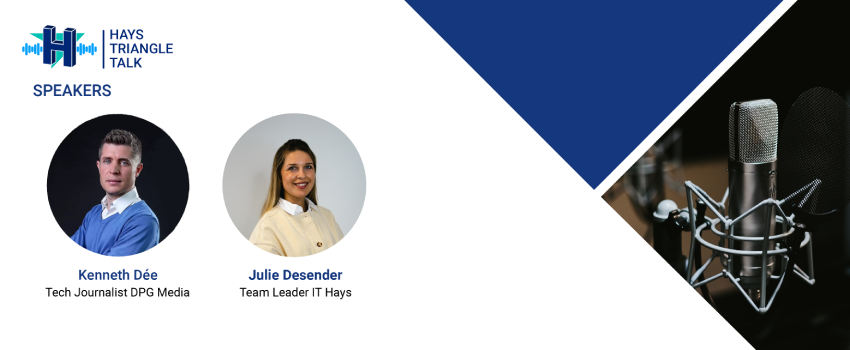Triangle Talk: The Impact of AI, XR, and ChatGPT on the future of HR

If you’ve been following the media, you would think AI has only been invented a few months ago. ChatGPT already seems indispensable in our society and job. And then there’s XR and VR, those tech things in games. Just like with any new technology, the question quickly arises: what will it mean for our job - will we still have one in the near future? Or for our business: are we keeping up with the latest technology? How can we use AI and XR to their full potential? And, how long before AI really becomes indispensable?
Kenneth Dée, Tech Journalist at DPG Media and Julie Desender, Team Leader IT at Hays discuss the benefits, challenges and pitfalls of AI, XR and ChatGPT and what impact they have on our jobs in our podcast Triangle Talk. Read the highlights and most remarkable quotes from this enriching conversation between two technology specialists.
"AI is not new, it has been part of our daily lives for a very long time"
AI has been a part of our daily lives for a long time. Kenneth takes the keyboard of our smartphone as an example. This is a simple example of AI that we have been using daily for a very long time. He explains: "The keyboard of your smartphone predicts what you are going to type based on the first two letters you type. This is a computer that thinks with you and appears to be reasoning on its own. Based on knowledge it has gained in the past, AI can process new input. In this example, the computer has learned which words exist and what follows a particular word. Based on that knowledge, it’s going to try to help you in your daily life.
XR is another category of technology. It’s about blending reality with what we see and know now. "For example, XR glasses would give extra information about the person you are talking to," Kenneth explains. It gives interactive information about our environment. "It's a hot topic now because Apple is going to capitalize on this in the coming months."
"No worries, AI will not take away our jobs, for now"
Julie reassures us and says not to worry just yet. There’s a shift in the job market, though: "New jobs and profiles are emerging steadily. There are about five hundred vacancies for data scientists in Belgium right now. The demand for knowledge of new technologies such as machine learning, deep learning and cloud is rising very fast." Many companies are anticipating this by upskilling. She adds that "robots still need to be programmed, data still needs to be analyzed and interpreted, so we won’t lose our jobs any time soon!"
"AI isn't replacing us, it's helping us."
AI won't be writing articles for journalists, or at least not all of them? Kenneth explains that AI could write articles that journalists don’t like to write. "Only the big bulk of articles of which you can easily collect information on. AI will be able to write these and make us save time." In the media, AI is mostly looked at in that context. "It leaves more time to focus on bigger stories." Reports also no longer have to be made with expensive equipment and a full team. "You can keep those for bigger stories," Kenneth said. "Undercover reports can perfectly be shot with a smartphone. New cameras and other equipment all have AI integrated systems. They can interpret light and recognize faces." Julie adds that it’s a gain in productivity and very cost-saving in many sectors.
"AI still has a long way to go before it is completely bias-free"
Julie doesn’t use AI for CV screenings; they all go through her own hands first. Kenneth raised the following concern: "What about people who don't have the required technical skills but can work with AI? To what extent is even the IT sector reacting too slowly, since the productivity of someone using AI is much higher? " Julie replies that it’s an upcoming danger we need to prepare for. “There’s an AI tool called GitHub Copilot, for programmers who are less technically strong but still want to program.” This makes jobs like programming accessible to anyone who knows how to use AI very well.
"We need to communicate transparently about our use of AI"
One thing we know is that AI is not completely bug-free yet. Julie believes that using AI for initial CV screenings should be okay if the next steps involve humans. In journalism, AI is already being used more regularly, and since a month they’ve also incorporated a rule: transparency. All source citations clearly explain that AI was used so the reader is aware of this.
In recruitment, AI can be used for automatic CV screening, but Kenneth explains that, just like in journalism, it must be clearly communicated to the applicant. “If you apply with an 'atypical' CV or haven't worked for a long time due to illness, AI may declare your CV as unsuitable. When applicants know that AI was used, they can appeal this decision and have their CV reviewed by a real recruiter."
“We're missing out on great candidates because of niche discrimination”
According to Kenneth, certain profiles are disadvantaged in the current algorithms. This is because of the very visible bias of AI, which will be gone in the coming years. It’s the niche discrimination that’s difficult to detect. More time will be needed to make everything free of bias, discrimination, … The current algorithms are making us miss great candidates.
In her job as a recruiter, Julie prefers to take a route with less risks: "we can already use ChatGPT to write our job postings". She’s also waiting for Microsoft's new applications where she will automatically receive a report of her Teams meetings. "These are tools that will help improve my work as a recruiter," she says.
In her job as a recruiter, Julie prefers to take a route with less risks: "we can already use ChatGPT to write our job postings". She’s also waiting for Microsoft's new applications where she will automatically receive a report of her Teams meetings. "These are tools that will help improve my work as a recruiter," she says.
“Even the younger generation can't keep up."
We can't imagine a life without AI anymore. The evolution is happening extremely fast, which makes it scary. "Even the younger generation can’t keep up. Young graduates looking for a job are not optimally prepared for the new job market," Kenneth says. He gives the example of entry-level journalists who don’t know how to make a report using their smartphone. "They’re still taught how to make these with very expensive equipment." With the advancement of AI, it would be much better to teach this in school already. "In the long run, these AI developments will be essential in the devices we use. And we need to embrace this. Because we can't stop it anyway," Kenneth said.
"Everything is overhyped when it's new"
The rise of virtual reality was heavily overestimated in the past and now it’s being underestimated, according to Kenneth. Many companies look at mixed reality as something fun but "it's not worth a real investment yet" according to most companies. Belgian companies are not really keeping up with the new VR and XR trends, according to Julie. Kenneth agrees, adding that "they do it for the fun marketing, so they can send out press releases to show how trendy they are." Both tech specialists agree that there’s an increased demand for professionals in XR and VR.
"VR makes the job market more accessible to a wider group of professionals"
People who have had serious injuries on construction sites can keep their jobs and control bulldozers remotely thanks to XR. "With this new way of working, you can also avoid serious work injuries and prioritize your employees’ safety by taking them away from those dangerous construction sites. Thanks to VR, some jobs will be more accessible," says Kenneth.
“Employers are responsible for ensuring that employees stay up to date”
Making sure employees learn new skills while continuing to use their old ones thanks to upskilling is the solution for the future, according to Julie. Kenneth believes that your degree doesn’t really matter: "a school education isn’t enough to have a long career in technology. It's more of a mindset thing, to never want to stop learning new skills. Employers should make sure employees have access to mixed reality setups because they’re expensive. Keep employees stimulated and educated!" is Kenneth's advice.
"Companies have to guess which new technology is worth an investment"
"We’re talking about a full spectrum of technologies that have a significant impact on our lives. Self-driving cars would be a huge time saver for people who spend hours in traffic jams on their way to work. They could work on the go or consume other media. This could totally change the way we work, but it could also have an impact on our media consummation. People might no longer listen to morning radio but watch TV instead." Companies have to guess which investment to make, as covering the full spectrum is very difficult.
Kenneth concludes with expressing one of his worries: “That old mindset that AI can’t be creative is no longer correct, we need to be prepared for even more changes.”
If you enjoyed this recap, you can listen to the full episode here (in Dutch). Subscribe to Triangle Talk on Apple Podcasts, Google Podcasts and Spotify for more inspiring stories. Don’t forget to leave us a review!
Be sure to connect with us on LinkedIn, Instagram and Facebook, and if you know someone who you think would enjoy this episode, please share it with them on social media.
Benedicte Mbayi
Content Marketeer Hays Belgium


Salary guides
The Hays salary guides provide a clear overview of current salaries and offer insights into market and recruitment trends.




